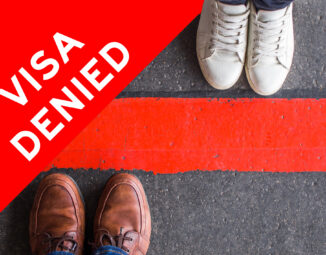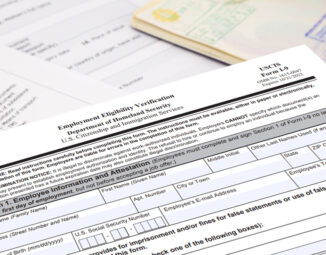USCIS Offers Additional Guidance on the L-1B Specialized Knowledge Visa Program
Tomorrow, Friday, April 3, 2015, is Good Friday on the Christian calendar (except for Orthodox believers), and sundown marks the beginning of the Jewish feast of Passover. This rare coincidence of religious celebrations brings to mind Shakespeare’s observation that, “Ignorance is the curse of God; knowledge is the wing wherewith we fly to heaven.” And though it may well be true that knowledge is a means to immortality, it might not be sufficient for a foreign worker to obtain an L-1B visa, reserved for individuals with “specialized knowledge” of a company’s products, policy’s or procedures. The L-1B visa has been mired in confusion, high denial rates, and inconsistent application for years, due in part to a lack of clarity as to what counts as “specialized knowledge.” The bard, and our readers, can now take some comfort in the fact that on March 24, 2015 USCIS released its draft Policy Memorandum (“L-1B Memo” or “Memo”) offering clarification on the definition of “specialized knowledge.” The long awaited L-1B Memo is welcome news for employers and immigration practitioners who have seen an increase in the denial rates of L-1B petitions, an increase in the numbers of Requests for Additional Evidence (RFEs), and a lack of clarity and consistency on the part of USCIS adjudicators in reviewing L-1B petitions.
Background
The L-1 visa is a nonimmigrant visa that allows companies to transfer employees from a related foreign entity to a U.S. company. This visa category has two types: the L-1A visa for transfer of Executive and Managerial personnel and the L-1B visa for transfer of specialized knowledge personnel. The L-1B nonimmigrant classification enables a U.S. employer to transfer a professional employee with specialized knowledge relating to the organization’s interests from one of its affiliated foreign offices to one of its offices in the United States.
The Immigration Act of 1970 created the L-1 visa program in order to enable employers to more effectively transfer foreign personnel vital to the interests of U.S. businesses. This included personnel with “specialized knowledge” of the company’s products, policies, and/or procedures. However, as the L-1B Memo recognizes, the 1970 Act did not define “specialized knowledge” and the term has developed over time through a series of agency regulations and precedent decisions, subject to a long series of increasingly restrictive requirements. L-1B petitions have been under increased scrutiny by USCIS for several years, in part due to a lack of clarity on the part of adjudicators applying regulations in an inconsistent, arbitrary manner or asserting requirements that have no foundation in immigration statutes or regulations; for example, the erroneous requirement that specialized knowledge must relate to “proprietary” information, or that for knowledge to be “specialized” such knowledge cannot otherwise be available in the U.S. labor market. According to a report by the National Foundation for America L-1B denial rates reached a high of 35 percent in fiscal year 2014. Requests for evidence —which employers and practitioners say create unnecessary delays—were issued in 45 percent of L-1B cases filed in FY 2014. By comparison, in FY 2006 there was a 6% denial rate and a 9% RFE rate.
Why is the L-1B Memo Important for Employers?
To help bring much needed clarity to the L-1B visa process, the Memo defines the elements of “specialized knowledge” as Special Knowledge, which is knowledge of the petitioning employer’s product, service, research, equipment, techniques, management, or other interests and its applications in international markets that is demonstrably distinct or uncommon in comparison to that generally found in the particular industry or within the petitioning employer; or
Advanced Knowledge, which is knowledge or expertise in the organization’s specific processes and procedures that is not commonly found in the relevant industry and is greatly developed or further along in progress, complexity and understanding than that generally found within the petitioning employer.
The Memo expressly denies that specialized knowledge must be propriety and rejects the idea that for knowledge to be specialized it cannot otherwise be available in the U.S. labor market.
To assist adjudicators in evaluating petitions, the Memo offers a non-exclusive list of factors that adjudicators may consider when determining whether a beneficiary’s knowledge is specialized. For example, the foreign employee may possess “knowledge of a product or process that cannot be easily transferred or taught to another individual without significant economic cost or inconvenience”; or, the foreign worker may have “knowledge of a process or a product that either is sophisticated or complex, or of a highly technical nature.” The Memo affirms that the burden is on the petitioning employer to establish by a preponderance of the evidence that the foreign worker possesses specialized knowledge. The Memo also provides a list of types of evidence an employer can submit, describes the special criteria for L-1B employees who work off site, and states that adjudicators should give deference to prior adjudications when examining L-1B extension requests.
What Can Employers and Practitioners Expect?
The L-1B Memo will likely result in more consistent application of standards by adjudicating officers since they now have clearer guidelines to follow. However, it is not certain that the Memo will result in an increase of L-1B approvals or a decrease in RFEs. In fact, the opposite could occur: armed with new policy guidance, adjudicators may now begin applying the list of evaluative criteria in a rigid manner, demanding additional evidence if a petition lacks certain items not on the new list despite the fact that the list is non-exclusive and no matter how well documented a petition might otherwise be.
The Memo is scheduled to go into effect on August 31, 2015. Between now and then HR Legalist recommends that employers review the new policy guidelines with the advice of legal counsel to make sure their current and future L-1B petitions are well documented and consistent with the definitions and evidentiary requirements as explained in the Memo. And if your foreign employee is a gifted playwright, worthy of Shakespeare’s Globe, you may be well to gently remind him that if his knowledge is not special enough for an L-1B visa, he’s in good company as he makes his way to loftier regions, beyond the jurisdiction of USCIS.



